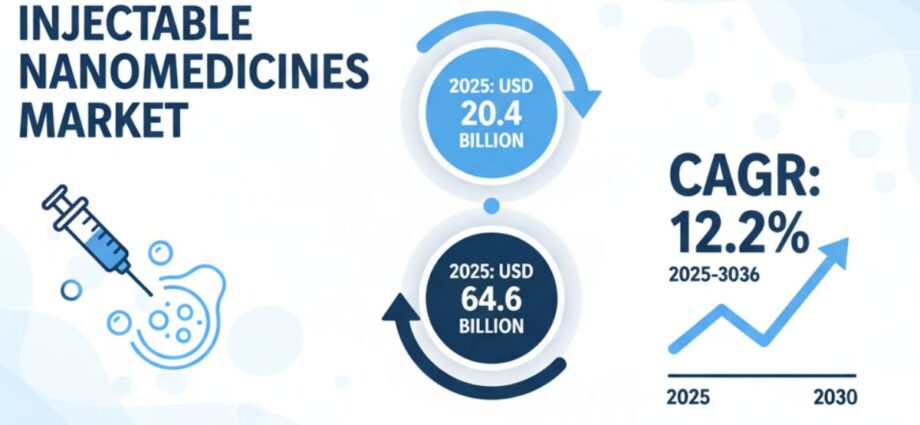The Injectable Nanomedicines Market is forecast to achieve remarkable growth, rising from USD 20.4 billion in 2025 to USD 64.6 billion by 2035, at a robust compound annual growth rate (CAGR) of 12.2%. The market’s momentum is driven by rising global demand for targeted drug delivery systems, growing cancer prevalence, and continuous advancements in nanotechnology-based therapeutics.
Nanomedicines are redefining clinical practice by enabling precise drug targeting, reduced toxicity, and improved therapeutic outcomes. As healthcare systems pivot toward personalized medicine, injectable nanomedicines are becoming indispensable across oncology, cardiovascular, and neurological applications.
Market Drivers and Growth Opportunities
The Injectable Nanomedicines Market is expanding rapidly as healthcare providers increasingly adopt advanced nanocarrier systems to enhance treatment efficiency. Growing investments in biotechnology R&D and the shift toward controlled-release therapies are accelerating innovation across the sector.
Several key factors driving market growth include:
- Rising incidence of chronic diseases, particularly cancers and CNS disorders.
- Growing preference for precision medicine, enabling patient-specific drug formulations.
- Increased funding for nanotechnology research, supporting the development of novel formulations and biocompatible carriers.
- Technological advancements in nanoparticle design, improving stability and targeted delivery.
Liposomes remain the leading drug type segment, capturing 34% market share in 2025 due to their ability to encapsulate both hydrophilic and hydrophobic compounds while minimizing systemic exposure.
Competitive Landscape and Market Positioning
The Injectable Nanomedicines Market features strong competition among pharmaceutical giants and biotech innovators. Pfizer, Merck, Amgen, Celgene Pharmaceutical, Pacira Pharmaceuticals, and Hoffmann-La Roche lead the industry through strategic collaborations and product innovations.
Pfizer and Merck continue to strengthen their presence through oncology-focused nanomedicine portfolios, while Lupin and Teva Pharmaceutical Industries are expanding in emerging markets with cost-effective formulations. Amgen and Janssen Biotech are investing heavily in immuno-nanomedicine for cancer and autoimmune disorders, reinforcing the market’s innovation trajectory.
This competitive synergy is driving not only product diversification but also broader clinical acceptance, as hospitals and research centers adopt nanomedicine-based therapies as standard care protocols.
Buy Now & Save: Premium Market Report at $5,000 | Discount Details Inside:- https://www.futuremarketinsights.com/reports/sample/rep-gb-7993
Regional Insights and Global Expansion
Geographically, North America remains the dominant region in the Injectable Nanomedicines Market, supported by advanced healthcare infrastructure and regulatory support for novel therapeutics. The Asia-Pacific region, led by China (16.5% CAGR) and India (15.3% CAGR), is emerging as a major growth engine due to escalating investments in nanotechnology and pharmaceutical manufacturing.
Europe—with significant activity in Germany (14.0% CAGR) and France (12.8% CAGR)—continues to show steady expansion, benefiting from government-backed clinical research programs. Meanwhile, Brazil and South Africa are paving the way for nanomedicine accessibility across Latin America and Africa.
Segmental Leadership: Liposomes and Cancer Applications Drive Growth
The liposomes segment leads by revenue share, driven by its proven clinical efficacy and scalable manufacturing. Liposomal formulations are extensively used in chemotherapy, immunotherapy, and combination therapies, ensuring sustained market dominance through 2035.
By application, the cancer segment holds 32% of the Injectable Nanomedicines Market in 2025. The integration of nanomedicine into oncology treatment has transformed patient care, offering reduced side effects and improved drug bioavailability. Hospitals remain the largest end user, accounting for 36% of total market share, due to their role in administering complex therapies.
Click Here to Purchase the Report:- https://www.futuremarketinsights.com/checkout/7993
Future Outlook: Precision Medicine and Technological Integration
The next decade will see Injectable Nanomedicines Market innovation focused on next-generation nanocarriers, combining diagnostics and therapeutics (theranostics) for enhanced patient outcomes. Integration with artificial intelligence in drug design and predictive modeling will further optimize nanoparticle-based therapies.
With growing adoption across oncology, cardiology, and infectious diseases, injectable nanomedicines are set to transform global healthcare delivery. As the market accelerates toward a USD 64.6 billion valuation by 2035, industry leaders are expected to compete on innovation, patient outcomes, and global accessibility.
About Future Market Insights (FMI)
Future Market Insights, Inc. (ESOMAR certified, recipient of the Stevie Award, and a member of the Greater New York Chamber of Commerce) offers profound insights into the driving factors that are boosting demand in the market. FMI stands as the leading global provider of market intelligence, advisory services, consulting, and events for the Packaging, Food and Beverage, Consumer Technology, Healthcare, Industrial, and Chemicals markets. With a vast team of over 400 analystsworldwide, FMI provides global, regional, and local expertise on diverse domains and industry trends across more than 110 countries.
Contact Us:
Future Market Insights Inc.
Christiana Corporate, 200 Continental Drive,
Suite 401, Newark, Delaware – 19713, USA
T: +1-347-918-3531
For Sales Enquiries: sales@futuremarketinsights.com
Website: https://www.futuremarketinsights.com
LinkedIn| Twitter| Blogs | YouTube

